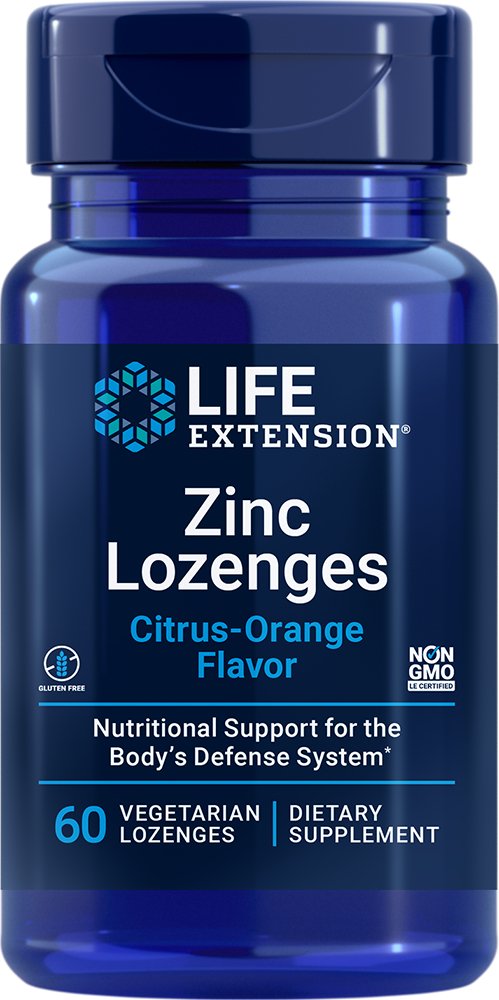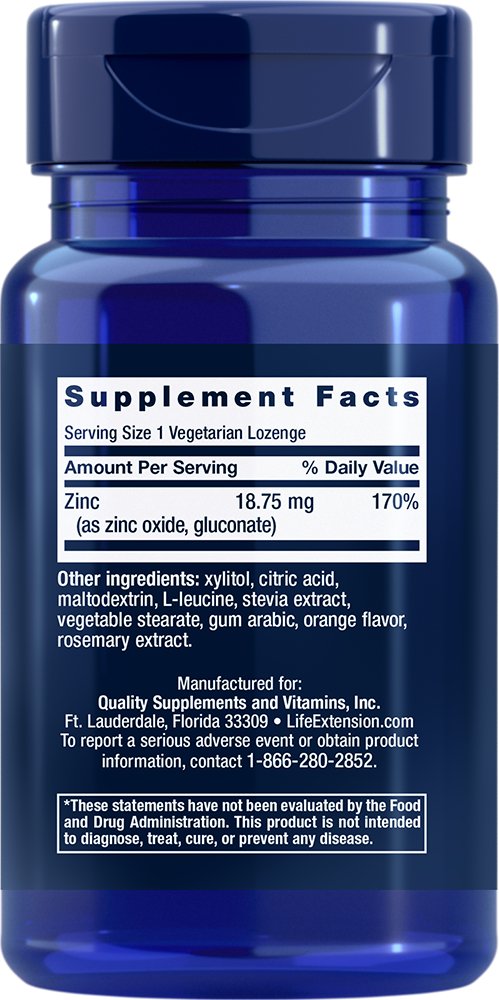Zinc Lozenges (60)
Zinc Lozenges (60) Black is backordered and will ship as soon as it is back in stock.
Zinc lozenges 60 tablets – Effective support for the immune system
Zinc lozenges offer a convenient and tasty way to support the immune system. These tablets contain zinc in the form of zinc oxide and zinc gluconate, known for their high bioavailability and effectiveness. With a natural taste of citrus and orange, this supplement is ideal for daily use, especially for adults who want to maintain a healthy immune system and general health.
Benefits and effects
- Support for the immune system: Zinc plays a key role in maintaining the normal function of the immune system and protects the body against oxidative stress by promoting the formation of superoxide dismutase, one of the body's most important antioxidants.
- Cell division and growth: Contributes to normal growth and development during pregnancy, childhood and adolescence, and is important for the regeneration of cells throughout the body.
- Hormone production: Zinc is essential for the synthesis of insulin and supports reproductive functions, including sperm motility and development of reproductive organs.
- Skin and wound healing: Promotes healthy skin and supports the body's natural ability to heal wounds.
- Support for taste and smell: Zinc contributes to normal taste sensitivity, which can improve the enjoyment of food.
- Aging-related benefits: Studies show that adequate levels of zinc can support the function of the thymus gland and help counteract immunodeficiency in the elderly.
Technical details and specifications
- Portion size: 1 vegetable lozenge.
-
Amount per serving:
- Zinc (as zinc oxide, gluconate): 18.75 mg.
- Other ingredients: Xylitol, croscarmellose sodium, natural citrus and orange flavor, stearic acid, citric acid, potato maltodextrin, stevia extract, gum arabic, vegetable stearate.
- Free for: Gluten, GMO, lactose, artificial flavors and colors.
Dosage and use
Allow one (1) lozenge to dissolve in the mouth or chew daily, or as recommended by a healthcare professional.
Warnings and precautions
- Supplementation of zinc can inhibit the uptake and availability of copper. If more than 50 mg of zinc is taken daily for a long time, it is recommended to supplement with 2 mg of copper to prevent copper deficiency.
- Chronic intake of more than 100 mg zinc daily may be immunosuppressive for some aspects of T cell and NK cell function.
- Keep out of the reach of children. Do not exceed the recommended dose.
Disclaimer and disclaimer
Permitted for adults over 18 years of age. All use of supplements is at your own risk and should be done in consultation with a doctor. The effect of the product may vary from person to person. Dietary supplements should not replace a varied diet. Uno Vita AS does not claim that the products we market can cure disease. The information provided is based on publicly available research and is intended as guidance.
Scientific references
- Prasad, A. S. "Zinc in human health: effect of zinc on immune cells." Molecular Medicine, 2008.
- Shankar, A.H., et al. "Zinc and immune function: the biological basis of altered resistance to infection." American Journal of Clinical Nutrition, 1998.
- Haase, H., et al. "Zinc and the immune system." Proceedings of the Nutrition Society, 2009.
- Fraker, P.J., et al. "The dynamic link between the integrity of the immune system and zinc status." Journal of Nutrition, 2000.
- Mocchegiani, E., et al. "Zinc and thymic hormone in the elderly." International Journal of Immunopharmacology, 1995.
- Scott, R., et al. "Zinc for the prevention of pneumonia in the elderly." British Journal of Nutrition, 2008.
- Singh, M., et al. "Zinc for the common cold." Cochrane Database of Systematic Reviews, 2013.
- Wessels, I., et al. "Zinc as a gatekeeper of immune function." Nutrients, 2017.
- Meydani, S.N., et al. "The effect of zinc supplementation on immune response in healthy adults." Nutrition Reviews, 2004.
- Kambe, T., et al. "Zinc transporters and their functional significance in the intestinal tract." Current Opinion in Gastroenterology, 2011.
- Huang, L., et al. "Zinc in cellular regulation: A signaling cofactor." Annual Review of Nutrition, 2006.
- Barnett, J.B., et al. "Zinc status and immune function: implications for the elderly." Current Opinion in Clinical Nutrition & Metabolic Care, 2010.









